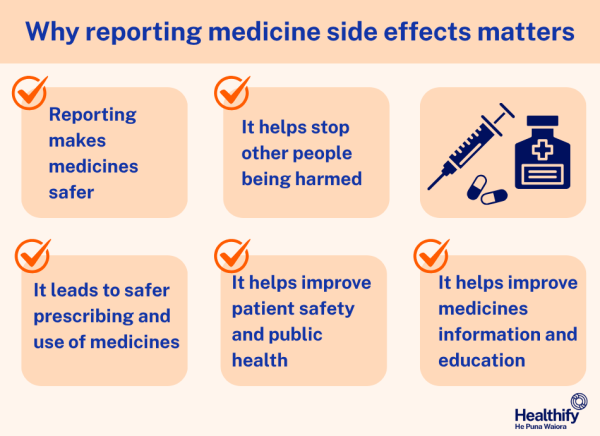You can now add Healthify as a preferred source on Google. Click here to see us when you search Google.
Reporting side effects
Key points about reporting medicine side effects
- Medicines are an important part of healthcare, but any medicine can have side effects.
- Reporting side effects of medicines makes medicines safer and helps protect everyone’s health.
- Side effects range from mild, such as drowsiness or feeling sick (nausea), to severe, life-threatening conditions that need to be treated in hospital.

Side effects are symptoms you feel when you take a medicine, including prescription medicines, over-the-counter (OTC) medicines, herbal remedies, vitamins and supplements.
Side effects range from mild, such as drowsiness or feeling sick (nausea), to severe, life-threatening conditions that need to be treated in hospital. Some side effects go away once your body gets used to the medicine, but others can last much longer. Read more about side effects.
Reporting side effects makes medicines safer and helps protect everyone’s health. It can prevent future harm to people taking the same medicine. It also helps to ensure safer prescribing and safer use of medicines in the future.
By reporting your side effects, you help to improve patient safety and protect public health, and also improve medicine information and education.

Image credit: Healthify He Puna Waiora
Although medicines are carefully tested in clinical trials, there are limits to those trials. These include:
- the number of people studied in the trial
- the people studied may not include special groups
- only some uses of the medicine are studied
- medicines may be tested for a shorter time period than it is prescribed.
The benefits of people reporting their experience include:
- identifying reactions that only happen in some people, which may not have been picked up clinical trials
- that information from special groups is noted
- the long-term effects become clearer
- interactions with other medicines or even food get identified
- more information about how severe and how common reactions and side effects are.
 If you think your medicine has caused a side effect, talk to your doctor. They may be able to lower your dose or change the medicine. Don't suddenly stop taking your medicine unless your doctor tells you to.
If you think your medicine has caused a side effect, talk to your doctor. They may be able to lower your dose or change the medicine. Don't suddenly stop taking your medicine unless your doctor tells you to.
It is important to let your doctor, pharmacist or nurse know about your side effects. Reporting side effects helps protect everyone's health.
You can also report side effects yourself through Centre for Adverse Reactions Monitoring (CARM)(external link).
CARM is a database of New Zealand-specific information on adverse reactions (side effects) to medicines and vaccines. CARM monitors this information to identify any issues to help with the safe use and prescribing of medicines. This may lead to changing prescribing or monitoring of medicines to ensure the safety of medicines registered in Aotearoa New Zealand.
Side effects of medicines Healthify He Puna Waiora, NZ
Medicines and falls risk Healthify He Puna Waiora, NZ
Medicines and sexual problems Healthify He Puna Waiora, NZ
Medicines and weight gain Healthify He Puna Waiora, NZ
Severe allergic reactions (anaphylaxis) to medicines(external link) (te reo Maori(external link)) Medsafe, NZ
Medicines for depression or other mental disorders and difficulties with sex (sexual dysfunction)(external link) Medsafe, NZ
Resources
Reporting side effects of medicines(external link)(external link) Medsafe and Ministry of Health, NZ, 2020
5 questions to ask about your medications(external link) Health Quality and Safety Commission, NZ, 2019 English(external link), te reo Māori(external link)
References
- Medication side effects – how likely are they to occur?(external link) Sussex Partnership, NHS, UK
- What are side effects?(external link) NHS, UK
- Understanding the frequency and severity of side effects: linguistic, numeric, and visual representations(external link) American Association for Artificial Intelligence, US, 2006
Brochures

Medicines and side effects
Healthify He Puna Waiora, NZ, 2024

Health Quality and Safety Commission, NZ, 2019 English, te reo Māori
Credits: Healthify editorial team. Healthify is brought to you by Health Navigator Charitable Trust.
Reviewed by: Angela Lambie, Pharmacist, Auckland
Last reviewed:
Page last updated:





